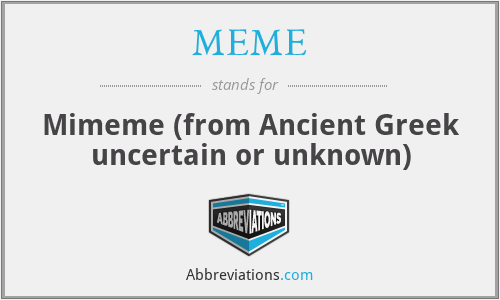The word meme is short for mimeme which means to imitate

The Origins and Meaning of “Meme”
When it comes to internet culture, the word “meme” is ubiquitous. These viral sensations spread like wildfire across social media platforms, bringing humor, inspiration, and sometimes even social commentary to our lives. But have you ever wondered where the term “meme” originated and what it truly means?
Etymology: The Birth of “Meme”
The word “meme” is derived from the Greek word “mimeme,” which means to imitate. This term was first coined by the renowned evolutionary biologist Richard Dawkins in his 1976 book, “The Selfish Gene.” Dawkins used the word to describe a unit of cultural transmission, similar to how genes transmit biological information.

Evolution of Ideas
In Dawkins’ view, memes are ideas, behaviors, or styles that spread from person to person, mimicking the process of biological evolution. They act as cultural replicators, subject to variations, mutations, and natural selection. Just as genes propagate and evolve through generations, memes thrive in the realm of human culture.
Memes in the Digital Age
With the advent of the internet and social media, memes have taken on a whole new life. They have become a fundamental part of online communication, allowing people to express themselves creatively and share their thoughts and emotions in a concise and relatable way.

The Modern Definition of “Meme”
Today, a meme is defined as a viral image, video, or piece of text that spreads rapidly through social media platforms, often with slight variations, alterations, or parodies. Memes can take various forms, such as humorous pictures overlaid with clever captions, short video clips, or even trending challenges.
The Power of Memes
Memes serve as a powerful tool for communication, engagement, and self-expression. They connect people regardless of geographical boundaries, cultural backgrounds, or beliefs. Memes convey emotions, highlight shared experiences, and provide a collective sense of humor that fosters a sense of community.
Conclusion
As the internet continues to shape our lives, memes have become an integral part of our daily online interactions. From conveying messages to making us laugh, they enrich our digital experiences. So, the next time you stumble upon a hilarious meme or find yourself sharing one with your friends, remember the origins of the term “meme” and how it has evolved to become the cultural phenomenon we know today.
Source: Wikipedia
Related Posts
Quick Links
Legal Stuff

